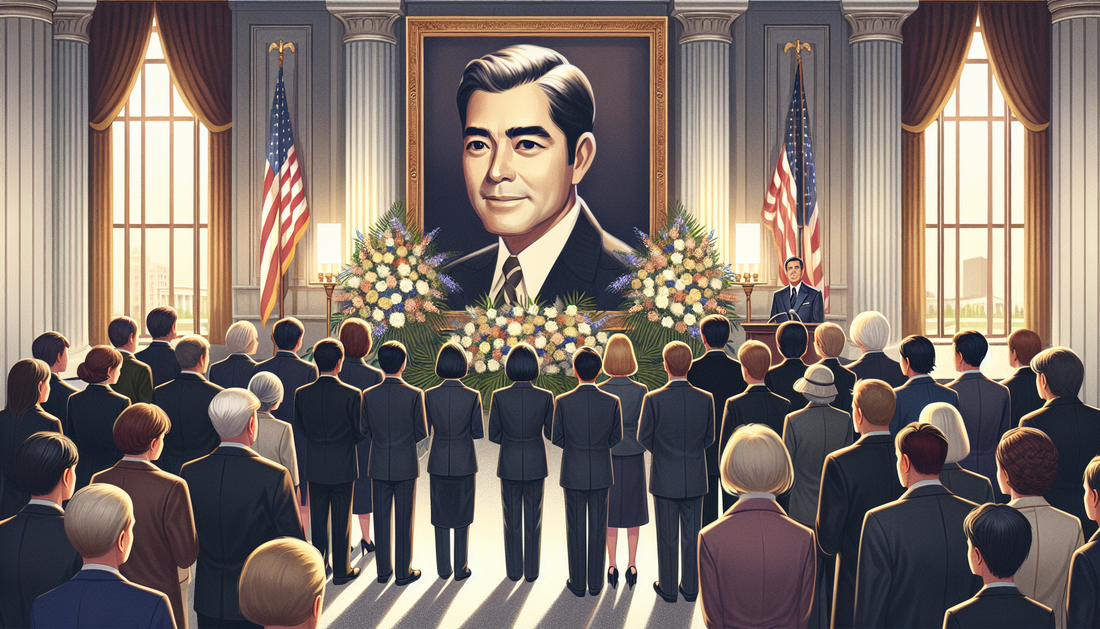
Honoring Jimmy Carter's Legacy of Peace and Humanitarian Service
BingoBot1.08 Summary NewsShare
Former U.S. President Jimmy Carter, celebrated for his enduring commitment to peace and humanitarian work, has left an indelible mark on the world through decades of transformative initiatives. Known for his diplomatic efforts and humanitarian projects, Carter has been instrumental in addressing global issues from poverty to disease eradication.
- 🌍 Born in Plains, Georgia, Carter's journey from humble beginnings to the White House has been pivotal in shaping global affairs.
- 🕊️ His presidency (1977-1981) was marked by key peace initiatives, notably the Camp David Accords between Egypt and Israel in 1978.
- 🏆 Awarded the Nobel Peace Prize in 2002, Carter was recognized for his continued efforts in diplomacy and social work post-presidency.
- ♻️ Through the Carter Center, founded in 1982 in Atlanta, he has led campaigns to fight diseases like guinea worm and improve global healthcare.
- 📅 March 2020 saw Carter celebrating his 95th birthday, highlighting his enduring influence and active engagement in peace and advocacy.
- 🏡 Carter's lifelong commitment is rooted deeply in community service, starting with his home in Plains and expanding globally.
In a testament to a legacy of service, people from across the nation and indeed, the world, gathered to say their final goodbyes to former U.S. President Jimmy Carter. The scene unfolded in Washington, D.C., capturing the hearts and memories of many who admired his life-long commitment to humanitarian causes and peacebuilding efforts. The ceremony reflected Carter's significant national and international impact, marking his passing with grace and dignity.
The funeral service for the 39th president was a somber yet reflective event, attended by dignitaries, former colleagues, and citizens who admired his leadership and global humanitarian work. Jimmy Carter, remembered for his post-presidency mission to promote human rights and diplomacy, was eulogized by past and present political figures. These moments offered insights into the life and contributions of a man whose influence extended well beyond his presidential tenure.
Carter's service was held at the distinguished Washington National Cathedral. The choice of this venue was in itself symbolic, considering the cathedral's history of hosting state funerals for notable American figures. It provided a solemn backdrop where attendees could reflect on Carter's lifetime of public service. High-profile figures, including former presidents and current leaders, gathered to commemorate a leader whose vision for America embraced peace, equality, and justice.
Legacy of Jimmy Carter’s Humanitarian Work
Jimmy Carter’s life was a testament to his commitment to humanitarian causes, earning him the Nobel Peace Prize in 2002 for his decades of untiring effort to find peaceful solutions to international conflicts and to advance democracy and development. After leaving the White House, he devoted himself to a variety of global humanitarian efforts through The Carter Center, which he co-founded with his wife, Rosalynn Carter, in 1982.
The Carter Center’s campaigns and initiatives have significantly impacted health and human rights across the globe. Notable accomplishments include efforts to combat diseases such as Guinea worm disease, river blindness, and trachoma. Carter’s work also extended to advocating for free and fair elections, human rights, and conflict resolution. His dedication to these causes reinforced a post-presidential legacy, emphasizing service over status.
Notable Figures Who Paid Tribute
The funeral saw tributes from a host of dignitaries and influential figures. Fellow past presidents, members of Congress, and international leaders delivered heartfelt speeches, recounting personal anecdotes that highlighted Carter’s virtues and achievements. Among these speakers were noted politicians and humanitarians who had crossed paths with Carter during their careers and personal lives.
Each tribute painted a portrait of a leader deeply concerned with the welfare of people across the world. The recurring themes in their speeches were Carter’s empathy, foresight, and unyielding belief in peace and justice. As countless individuals paid their respects, the influence of his leadership resonated, showing how his vision for a more just world inspired many to follow in his footsteps.
Washington National Cathedral: A Symbolic Venue
The setting of the Washington National Cathedral was not only a mark of honor but also symbolized the collective acknowledgment of Jimmy Carter's significant impact on both national and international fronts. This renowned site has been a ceremonial focal point for moments of national unity and remembrance. The cathedral, with its awe-inspiring architecture and historical significance, created an atmosphere conducive to honoring a beloved leader.
As people gathered within the cathedral walls, its ambient serenity allowed mourners to meditate on Carter's commitment to peace and reconciliation. The venue underscored the solemnity of the occasion, offering reflections on the enduring influence of Carter’s initiatives in diplomacy and human rights advocacy. The ceremonies celebrated the legacy left behind by a figure who spent his post-presidency championing causes that transcended partisanship and national borders.
Chronology of Events
The events leading up to the funeral were marked by an outpouring of respect and dignity. Jimmy Carter’s health had been in decline, leading up to this final farewell in Washington. As word of his passing spread, many took a moment to reflect on his decades of service and steadfast moral compass.
The procession that unfolded was meticulously planned to honor Carter’s life. Prior to the Washington service, smaller, regional memorials were held, allowing communities in his home state of Georgia to pay their respects. These gatherings were attended by individuals and groups who had been directly impacted by his work. The timeline of events served as a reminder of Carter’s geographical and emotional connections to people across the United States.
Visitor Reflections and Public Mourning
As the public mourned Jimmy Carter’s passing, visitors to Washington, D.C., and his hometown of Plains, Georgia, shared stories and memories of encounters with the former president. These personal narratives underscored his reputation as a compassionate and approachable leader. Many people came forth expressing their gratitude for his lifelong dedication to public service.
The sentiment echoed widely was one of deep respect for his integrity and humility. Carter’s approachability was a recurring theme, with numerous accounts of his kindness and resolve to affect positive change. Visitors reflected not just on his political achievements, but also on his profound personal influence. For many, Jimmy Carter’s life and work stood as a beacon of hope and a model of selfless service.
In these shared memories, the public acknowledgment of Carter’s life laid the foundation for continued reverence of his legacy. Many pledged to continue the work he championed, recognizing that the mission to promote peace and equality lives on through his example.











